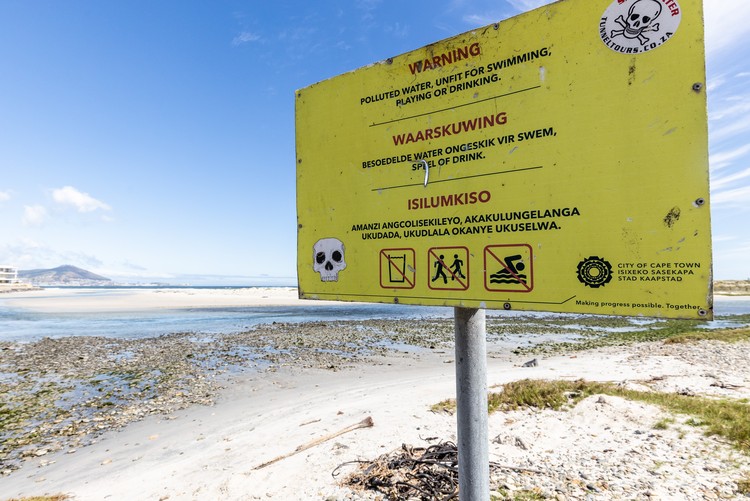Fish die-off in polluted Milnerton lagoon
City of Cape Town says cause is probably growth of algae
A recent fish die-off in the sewage-polluted Milnerton Lagoon was probably the result of growth of algae which depleted the oxygen in the water, says the City of Cape Town. Photo: Ashraf Hendricks
- The fish die-off in the polluted Milnerton Lagoon in Cape Town on 8 October was the result of algae growth, says the City of Cape Town.
- The City said the growth of algae had depleted oxygen in the water.
- The Organisation Undoing Tax Abuse (OUTA) says the City is taking too long to comply with orders to clean up the lagoon and fix the failing Potsdam wastewater treatment works.
A recent fish die-off in the Milnerton lagoon was probably caused by rapid algae growth in the sewage-polluted estuary, the City of Cape Town said last week. This is the second fish die-off this year.
The die-off was probably caused by depleted oxygen levels in the water caused by the growth of algae, according to City spokesperson Luthando Tyhalibongo, but he said the City is not entirely sure. “Nutrient loading that has built up in the system over many years is also a significant problem,” he said.
The City’s nature reserve staff and pollution control staff went to lagoon on 8 October 2022, took water quality samples and identified the fish affected, said Tyhalibongo.
The draft Diep River Estuary Management Plan, outlining the City’s priorities to tackle the pollution issues in the estuary, is still to be finalised.
The Diep River, which flows into the Milnerton lagoon, has suffered prolonged pollution from the Potsdam wastewater treatment works. The draft plan describes the E. coli as “high and increasing”.
Inland water quality results from the City show that Diep River has fallen consistently below the City’s E. coli target. While the overall water quality improved from June to August by about 16%, the most recent results from August show that E. coli levels in the Diep River are still far more than the City’s risk threshold of 4,000 E. coli CFU/100ml, particularly in samples taken close to the Potsdam works.
The City is planning to upgrade the failing Potsdam works and the upgrade of R2.2 billion will be complete by 2026. Tenders for these upgrades were closed earlier this year.
Ferrial Adam of the Organisation Undoing Tax Abuse (OUTA), which has been challenging the City on the pollution issue for years, said the upgrades will take too long and low quality effluent will continue to be discharged into the Diep River until 2026.
She said the City has no clear timelines for action being taken following the directive issued by the Green Scorpions in 2020, ordering the City to clean up the pollution. An audit by the Green Scorpions in December last year showed that the City was meeting only five of 16 conditions.
Adam said that during a site visit to the Diep River estuary at the end of September City officials had said the effluent quality should be improving, but the fish die-off had shown that this is not the case.
In the draft plan the City outlines priorities for improving water quality and managing the declining ecological state of the estuary. In the plan the City notes that water quality in the Diep River has declined due to a number of things: low quality effluent from Potsdam, sewer spills from pump stations, urban run-off from stormwater drains, and informal settlements upstream. In 2020, there were 122,000 sewer spills in the Diep River.
Tyhalibongo said that the City is committed to resolving the issues in the Diep River and Milnerton Lagoon but that there are “no quick or single solutions”.
Support independent journalism
Donate using Payfast

Don't miss out on the latest news
We respect your privacy, and promise we won't spam you.
Next: Former Lottery boss personally recommended R4.8-million grant for his wife’s company
Previous: Book Festival brings authors and poets to the Cape Flats
© 2022 GroundUp. This article is licensed under a Creative Commons Attribution-NoDerivatives 4.0 International License.
You may republish this article, so long as you credit the authors and GroundUp, and do not change the text. Please include a link back to the original article.
We put an invisible pixel in the article so that we can count traffic to republishers. All analytics tools are solely on our servers. We do not give our logs to any third party. Logs are deleted after two weeks. We do not use any IP address identifying information except to count regional traffic. We are solely interested in counting hits, not tracking users. If you republish, please do not delete the invisible pixel.

